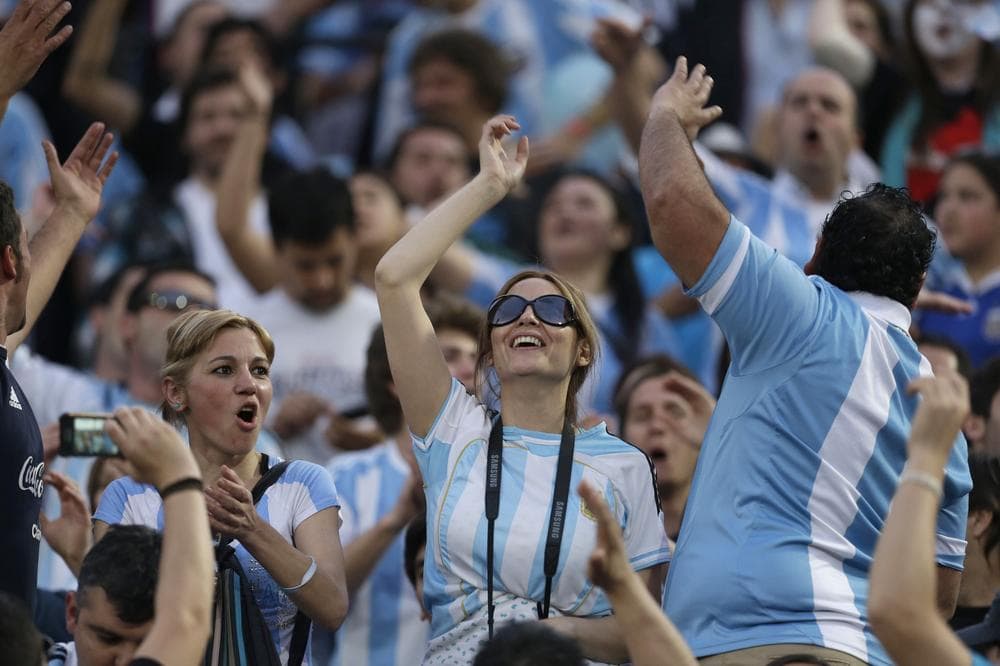Advertisement
Feature
Argentine Women Seek Equality On The Pitch

This December, eight women signed up to play soccer—or, as it’s called in Argentina, football—at a video game company’s end-of-the-year celebration. Human Resources sent out an email asking if they should put together co-ed teams.
“Some men answered, like, ‘Is this for real? Like, are women going to play with us? I thought it was going to be football for real,’” Sergio Sarmiento said. “They were being serious; they were not wanting to play with women, like saying, ‘OK, I don’t want to play. Take me out of the list.’ So, in the end, what people from Human Resources ended up doing was to make women play separately.”
In Argentina, stereotypes about women who play soccer abound.
“Once, while we were eating lunch at work, I mentioned that I play soccer,” Monique Ferronatto said. “One of the guys said, ‘For me, a girl that plays soccer is very masculine. It’s strange. I don’t accept the idea that a girl can play soccer without being masculine.’”
“I ask my grandchildren, who all love soccer: ‘No, women’s soccer games are really boring, Grandma,’” Adolfina Janson added.
But more and more Argentine women are refusing to limit themselves to those choices. Over the last couple of years, women have hired coaches, put together tournaments, and started to change the face of Argentine soccer. 29-year-old Helga Zambrana, an editor, started to play soccer last year.
“Lots of companies pay for or rent soccer fields for their male employees. It’s like an extra benefit that they get,” Zambrana said. “There are very few companies that do the same for women. So, my female coworkers and I got together and said, ‘Why can’t we do the same?’”
Zambrana and her coworkers started to play regularly after work. Monique Ferronatto, who used to play on that team, says the group is doing its part to challenge stereotypes.
“Once, one of the guys from work came to play with us and he—it was like he couldn’t. Because he thought, ‘It’s going to be very easy to play with you guys,’” Ferronatto said. “And the truth is that he had a good time, but he had his moment of, ‘Oh, look, they don’t play so terribly.’”
Advertisement
Ferronatto and Zambrana are lucky: They picked up soccer two decades after a group of women started to pave the way for future female soccer players. Marcela Lesich, the first goalie for Argentina’s women’s national football team, always had to fight to play.
“I always played soccer with the boys in my neighborhood,” Lesich said. “I had to escape in order to play with them. I had to escape from my parents, always be afraid that they would catch me. My grandmother gave me—if she ever gave me something for soccer, my father would kill her. It was a bad word. A woman couldn’t have anything related to soccer.”
For me it was a dream come true: to play in a championship, to put a soccer jersey on—at home they never even bought me a soccer ball—and to be on a team. For me, that was heaven.
Marcela Lesich
Finally, after a childhood of fighting with her parents and playing pick-up games with boys, Lesich found a team at the age of 17.
“They had put together a soccer championship [on a small field] for girls, and I signed up,” Lesich said. “For me it was a dream come true: to play in a championship, to put a soccer jersey on—at home they never even bought me a soccer ball—and to be on a team. For me, that was heaven.”
When Lesich was 26 years old, she started to work as a taxi driver. At the time, she was playing both for the Argentine national team and for a professional soccer club, but she wasn’t paid by either and had to find other work. Overwhelmed by working full-time and playing for two professional teams, she dropped off the national team. To this day, none of Argentina’s professional female soccer players draws a salary, said Salvador Stumbo, the president of women’s soccer at the Argentine Football Association.
“What does a 20-year-old woman who plays soccer, but doesn’t get paid for it, do? Either she gets a boyfriend, or she has children, or she has to work in order to support herself,” Stumbo said. “But if she made real money playing soccer…which is what I advocate: ‘Pay the players. It’s the only way.’”
Though Argentina’s female soccer players still aren’t salaried, things are changing. When Marcela Lesich started to play soccer, no professional clubs in Argentina had women’s teams. Now 11 of Buenos Aires’ 60 clubs have teams for women, and there are even more teams and leagues in the rest of the country. When Lesich started to play for clubs, she and her teammates had to pay their own expenses. Now, some clubs pay for the travel expenses of their female players or give them a bonus if they win a championship. Marcela Lesich says she’s proud to be part of the struggle.
“If you take me out of Argentina, you take me away from the struggle. You take me away from the hope of moving forward. If I went to, for example, the United States, what would I do? I would already have everything solved,” Lesich said with a laugh.
This segment aired on January 26, 2013.